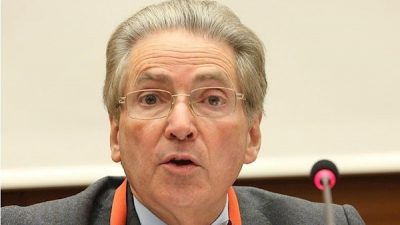
This is the body of a response by Alfred De Zayas to an inquiry he has received on how to contact the International Criminal Court (ICC). Alfred clearly outlines the difficulties one faces in attempting to contact the ICC, pointing to the political nature of the Court.
Professor De Zayas goes, however further, by focusing at the international crimes committed, to which the ICC does not or only haphazardly react – because the powers-that-be prevent it from taking actions. Prosecutors and judges are scared to do what they are supposed to do.
Many quit their jobs for fear of reprisals.
Please see for yourself the extraordinary account by Professor De Zayas, former Acting UN Commissioner for Human Rights in Geneva.
—Peter Koenig, May 23, 2025
***
The Politicization, Coercion and Disabling of the International Criminal Court
By Prof. Alfred de Zayas
If you are lucky enough to establish contact with the ICC, or the International Court of Justice (ICJ), as laymen and laywomen we can only send information to the Prosecutor [of the ICC under article 15 of the ICC Statute].
The Prosecutor has full authority to act thereon, but he also has full discretion and may ignore it.
The latter was his reaction to our [Geneva International Peace Research Institute] recent legal brief of 22 May 2024; 29 pages, signed by quite a few professors of law, on the complicity of the European Commission in genocide.
The ICC prosecutor did not act either on previous legal briefs submitted by top professors, e.g. against Tony Blair for violations of articles 6, 7 and 8 of the ICC statute in connection with the 2003 Iraq war; nor has he investigated the legal briefs submitted on behalf of the victims of war crimes committed by the US in Afghanistan.
Today it is all the more urgent to speak out, because what we are witnessing in Gaza is not only Apartheid, not only war crimes, but full-scale ethnic cleansing, already at the level of genocide within the meaning of the text of the 1948 Genocide Convention.
The ultimate crime is being perpetrated openly, in front of our eyes, despite three orders by the International Court of Justice (ICJ). And the governments of the United States, United Kingdom, France, Germany, etc. are all complicit in the crime (Article III e of the Genocide Convention) by providing military, economic, political, diplomatic and propagandistic support to the genocidal state.
The media also bears responsibility for whitewashing the crimes, downplaying the murder of civilians, the destruction of civilian infrastructure, hospitals, schools, churches, and temples, attacking medics, engaging in “apology of genocide.”
The jurisprudence of the international criminal tribunal for Rwanda gives us examples of “incitement” to genocide that are also relevant in the Gaza context. Some political statements by our own representatives and by journalists surely go over the threshold and constitute a violation or article III c of the Genocide Convention.
NEVER AGAIN — we must all protest and send copies of our protests to our representatives in Parliament, to politicians and journalists. We must go out in the streets and demonstrate — as I did 50 years ago against the Vietnam war; “Not in our name” — “If the government does not stop the Vietnam war, we will stop the government.”
Every day, every hour more innocent people are being massacred, even as I write these words.
In solidarity with humanity and all victims of war.
*
Click the share button below to email/forward this article. Follow us on Instagram and X and subscribe to our Telegram Channel. Feel free to repost Global Research articles with proper attribution.
Dr. Alfred-Maurice de Zayas, Professor of international law and history at the Geneva School of Diplomacy, has been a visiting professor at numerous universities in the US, Canada, Germany, Spain and Switzerland. From 2012 to 2018 he was the UN’s Independent Expert on International Order and produced 14 reports for the UN General Assembly and Human Rights Council, formulating “ 25 Principles of International Order”. From 1980 to 2003 he was a senior lawyer with the UN Human Rights Office in Geneva, served as Secretary of the UN Human Rights Committee and Chief of the Petitions Department. He is the author of ten books including “Building a Just World Order” (Clarity Press, 2021), “The Genocide against the Armenians” (Haigazian University Press, Beirut, 2010, translated into Spanish and Polish), “United Nations Human Rights Committee Case Law” (N.P.Engel, Strasbourg, 2009). He has published numerous articles concerning the Armenian genocide and the right of self-determination of the Armenians of Nagorno Karabakh and has spoken on these issues before the European Parliament. He is a US and Swiss national, resides in Geneva, Switzerland, with his wife Carla, a Dutch jurist, and was President of P.E.N. International Centre Suisse from 2006-9 and again from 2013-17.
Peter Koenig is a geopolitical analyst, regular author for Global Research, and a former Economist at the World Bank and the World Health Organization (WHO), where he worked for over 30 years around the world. He is the author of Implosion – An Economic Thriller about War, Environmental Destruction and Corporate Greed; and co-author of Cynthia McKinney’s book “When China Sneezes: From the Coronavirus Lockdown to the Global Politico-Economic Crisis” (Clarity Press – November 1, 2020). Peter is a Research Associate of the Centre for Research on Globalization (CRG). He is also a non-resident Senior Fellow of the Chongyang Institute of Renmin University, Beijing.
Global Research is a reader-funded media. We do not accept any funding from corporations or governments. Help us stay afloat. Click the image below to make a one-time or recurring donation.

Comment on Global Research Articles on our Facebook page
Become a Member of Global Research
Source link

